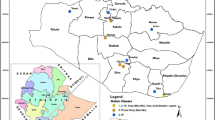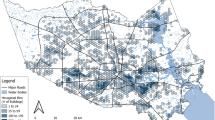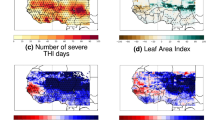Abstract
Climate change and related extreme weather events (EWEs) are expected to widen social and health inequalities. Yet, EWE thresholds and associated adaptation strategies do not centre experiences of vulnerable communities. This study explored the impacts of temperature- and precipitation-based EWEs for women in informal settlements, whether meteorological definitions of these EWEs capture impacts and whether self-reported impacts can be used to develop impact-based thresholds. We combined meteorological data with longitudinal monthly survey data collected from September 2022 through February 2023 from a probability sample of 800 women in two informal settlements in Nairobi, Kenya. Findings suggest that women experience health, economic, environmental, emotional, social and property impacts; thresholds of EWEs currently used for early action and preparedness are not capturing impacts; and, while self-reported impact data may provide an excellent first step in the process of (re)defining thresholds for some EWEs (for example, precipitation-based), more research and discussions with communities are needed.
This is a preview of subscription content, access via your institution
Access options
Access Nature and 54 other Nature Portfolio journals
Get Nature+, our best-value online-access subscription
$29.99 / 30 days
cancel any time
Subscribe to this journal
Receive 12 print issues and online access
$209.00 per year
only $17.42 per issue
Buy this article
- Purchase on Springer Link
- Instant access to full article PDF
Prices may be subject to local taxes which are calculated during checkout




Similar content being viewed by others
Data availability
The data supporting this study’s findings are available at: https://github.com/scw2154/NCC_DefiningExtremes (ref. 30).
Code availability
Code supporting the analyses run in this study are available at https://github.com/scw2154/NCC_DefiningExtremes (ref. 30).
References
Climate Change and Health Fact Sheet (WHO, 2021); https://www.who.int/news-room/fact-sheets/detail/climate-change-and-health
Darkey, D. & Kariuki, A. A study on quality of life in Mathare, Nairobi, Kenya. J. Hum. Ecol. 41, 207–219 (2013).
McCarthy, J. J., Canziani, O. F., Leary, N. A., Dokken, D. J. & White K. S. (eds) Climate Change 2001: Impacts, Adaptation and Vulnerability (Cambridge Univ. Press, 2001).
SDG 11: Sustainable Cities and Communities (United Nations, 2020); https://unstats.un.org/sdgs/report/2017/goal-11/
Hambrecht, E., Tolhurst, R. & Whittaker, L. Climate change and health in informal settlements: a narrative review of the health impacts of extreme weather events. Environ. Urban. 34, 122–150 (2022).
Seneviratne, S.I. et al. in Climate Change 2021: The Physical Science Basis (eds Masson-Delmotte, V. et al.) 1513–1766 (Cambridge Univ. Press, 2021).
McPhillips, L. E. et al. Defining extreme events: a cross‐disciplinary review. Earth’s Future 6, 441–455 (2018).
Dhimal, M. et al. Impact of climate change on health and well-being of people in Hindu-Kush-Himalayan (HKH) region—a review. Front. Physiol. 12, 1139 (2021).
Gender, Climate Change and Health (WHO, 2014); https://www.who.int/publications/i/item/9789241508186
Norris, F. H. et al. 60,000 disaster victims speak: Part I. An empirical review of the empirical literature, 1981–2001. Psychiatry 65, 207–239 (2002).
Obradovich, N., Migliorini, R., Paulus, M. P. & Rahwan, I. Empirical evidence of mental health risks posed by climate change. Proc. Natl Acad. Sci. USA 115, 10953–10958 (2018).
Cianconi, P., Betrò, S. & Janiri, L. The impact of climate change on mental health: a systematic descriptive review. Front. Psychiatry 11, 74 (2020).
Otieno, P. O. et al. Access to primary healthcare services and associated factors in urban slums in Nairobi-Kenya. BMC Public Health 20, 981 (2020).
MacLeod, D. et al. Are Kenya Meteorological Department heavy rainfall advisories useful for forecast-based early action and early preparedness for flooding? Nat. Hazards Earth Syst. Sci. 21, 261–277 (2021).
Gasparrini, A. et al. Mortality risk attributable to high and low ambient temperature: a multicountry observational study. Lancet 386, 369–375 (2015).
Li, M., Gu, S., Bi, P., Yang, J. & Liu, Q. Heat waves and morbidity: current knowledge and further direction—a comprehensive literature review. Int. J. Environ. Res. Public Health 12, 5256–5283 (2015).
Li, M., Ferreira, S. & Smith, T. A. Temperature and self-reported mental health in the United States. PLoS ONE 15, e0230316 (2020).
Tong, S. et al. Development of health risk-based metrics for defining a heatwave: a time series study in Brisbane, Australia. BMC Public Health 14, 10 (2014).
Xu, Z. et al. Impact of ambient temperature on children’s health: a systematic review. Environ. Res. 117, 120–131 (2012).
Reid, H., Swiderska, K., King-Okumu, C. & Archer, D. Vulnerable Communities: Climate Adaptation that Works for the Poor (International Institute for Environment and Development, 2015).
Scott, A. A. et al. Temperature and heat in informal settlements in Nairobi. PLoS ONE 12, e0187300 (2017).
Douglas, I. The challenge of urban poverty for the use of green infrastructure on floodplains and wetlands to reduce flood impacts in intertropical Africa. Landsc. Urban Plan. 180, 262–272 (2018).
Thorn, J., Thornton, T. F. & Helfgott, A. Autonomous adaptation to global environmental change in peri-urban settlements: evidence of a growing culture of innovation and revitalisation in Mathare Valley Slums, Nairobi. Glob. Environ. Change 31, 121–131 (2015).
Winter, S. C., Obara, L. M. & McMahon, S. Intimate partner violence: a key correlate of women’s physical and mental health in informal settlements in Nairobi, Kenya. PLoS ONE 15, e0230894 (2020).
Lind, K. & Oldendick, R. Comparison of the accuracy of the last birthday versus the next birthday methods for random selection of household respondents. Age 231, e7 (2000).
Lundine, J., Kovacic, P. & Poggiali, L. Youth and digital mapping in urban informal settlements: lessons learned from participatory mapping processes in Mathare in Nairobi, Kenya. Child. Youth Environ. 22, 214–233 (2012).
Improving Health in Slums Collaborative. A protocol for a multi-site, spatially-referenced household survey in slum settings: methods for access, sampling frame construction, sampling and field data collection. BMC Med. Res. Method. 19, 109 (2019).
Ethical and Safety Recommendations for Intervention Research on Violence Against Women: Building on Lessons from the WHO Publication Putting Women First: Ethical and Safety Recommendations for Research on Domestic Violence Against Women (WHO, 2016).
Seabold, S. & Josef, P. Statsmodels: econometric and statistical modeling with Python. In Proc. of the 9th Python in Science Conference (eds van der Walt, S. & Millman, J.) 57–61 (SCIPY, 2010).
Winter, M. & Winter, S. Extreme weather should be defined according to impacts on climate vulnerable communities. GitHub https://github.com/scw2154/NCC_DefiningExtremes (2024).
Acknowledgements
We thank our participants who gave their time to this study. We want to deeply thank our 16 community team members, A. L. Akinyi, A. M. Wambua, C. A. Amollo, C. A. Oyugi, E. N. Sila, E. Achieng, E. Bowa, G. M. Wambui, J. M. Ndambuki, J. N. Nyambura, L. Simiyu, M. Odhiambo, M. A. Joel, N. W. Kimeu, R. A. Otieno and S. A. Otieno; our community partner and advisor, C. Musyimi; and our staff member D. K. Mwanthi, who are the heart and soul of this work. This study was funded by the National Institute of Mental Health (R21MH127356, SCW). The funder was not involved in the study design or analysis.
Author information
Authors and Affiliations
Contributions
S.C.W. guided overall conceptual design for the study and analysis and preparation of the manuscript. M.R.W. contributed to data analysis, drafting of sections of the manuscript and revising the manuscript. L.P. contributed to data analysis and review and editing of the manuscript. A.K.B. contributed to data analysis and preparation of manuscript. M.D. directed and oversaw study implementation and data collection. L.P.T. guided data analysis and visualization and review and editing of manuscript. E.U., C.L. and L.O. drafted and reviewed sections of the manuscript. S.A.O. contributed to study implementation, data collection and analysis. R.M. conceived the study with S.C.W. and collected and analysed data. S.S.W. oversaw drafting of sections of the manuscript and revising of this manuscript. All authors read and approved this manuscript.
Corresponding author
Ethics declarations
Competing interests
The authors declare no competing interests.
Peer review
Peer review information
Nature Climate Change thanks Katharine Vincent and the other, anonymous, reviewer(s) for their contribution to the peer review of this work.
Additional information
Publisher’s note Springer Nature remains neutral with regard to jurisdictional claims in published maps and institutional affiliations.
Supplementary information
Supplementary Information
Supplementary Tables 1 and 2 and Figs. 1–8.
Rights and permissions
Springer Nature or its licensor (e.g. a society or other partner) holds exclusive rights to this article under a publishing agreement with the author(s) or other rightsholder(s); author self-archiving of the accepted manuscript version of this article is solely governed by the terms of such publishing agreement and applicable law.
About this article
Cite this article
Winter, S.C., Winter, M.R., Plaxico, L. et al. Extreme weather should be defined according to impacts on climate-vulnerable communities. Nat. Clim. Chang. (2024). https://doi.org/10.1038/s41558-024-01983-7
Received:
Accepted:
Published:
DOI: https://doi.org/10.1038/s41558-024-01983-7
This article is cited by
-
Extreme weather threatens informal settlements
Nature Climate Change (2024)



